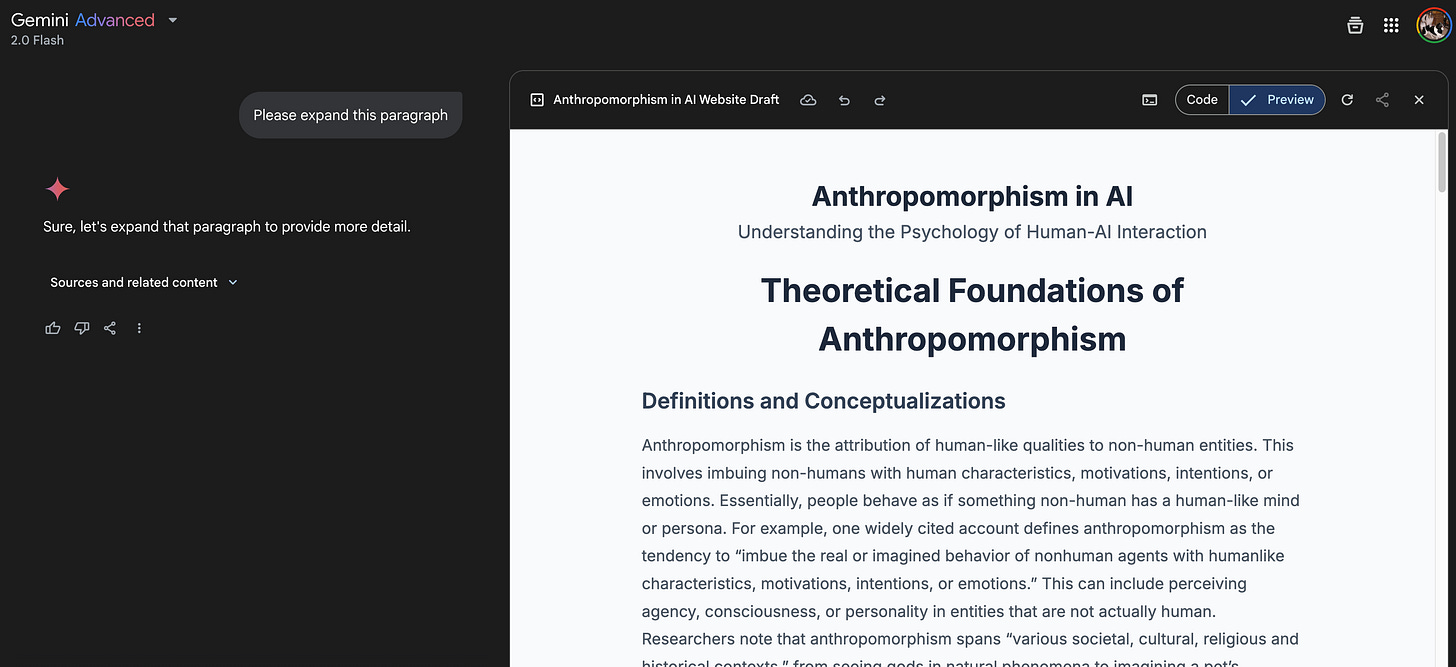Google Drops Two Huge Updates to Gemini: Audio Updates and Canvas
Google rolled out two important updates to Gemini this week, Audio Overviews and Canvas. Both are major developments that extend Gemini’s functionality and usefulness.
Audio Overviews
For educators and students struggling to process large amounts of reading material, AI-generated audio summaries represent a significant breakthrough in learning technology. One of the most innovative features of Google’s Notebook LM is the audio overview, which creates an NPR-style podcast based on resources you uploaded, such as articles or websites. The conversations are so realistic it’s kind of scary. Earlier this week, Google made audio overviews available in Gemini.
Getting to Audio Overviews is not immediately obvious. When you access Gemini, there’s no button for generating the overviews. You first need to add resources, which can be attachments or Google Docs.
I tested both. For the attachments, I uploaded some readings from one of my doctoral seminars. When I did, the “Generate Audio Overview” button appeared. Clicking on the button created a six-minute audio overview. The overview was reasonably good, although compressing five academic articles into six minutes of audio is a tall order. You can check out the audio overview here: https://g.co/gemini/share/3dbd662c3d71.
In my limited testing, Notebook LM seems to create much longer audio overviews, although the length of the overviews has always seemed a bit random. The Notebook LM audio overview was over seventeen minutes long, almost three times the length of Gemini’s version. I tried another comparison with similar results. Gemini’s audio overview of two articles I uploaded was 6:30 while Notebook LM’s was ten minutes longer. While the length differences are notable, both tools produced high-quality summaries that captured the key points of the source materials. Notebook LM has other capabilities as well, so I view Gemini’s new feature as an option rather than a replacement. In any case, it’s worth checking out, especially if you like learning from audio.
As if releasing Audio Overviews wasn’t enough, Google also released Canvas.
Canvas
Following in the footsteps of Claude's Artifacts and ChatGPT's Canvas, Gemini's Canvas provides an interactive workspace that transforms how users can create and refine content. Basically, Canvas provides a workspace in which you can work interactively with your output. For example, you might ask Gemini to create a lesson plan on decision-making. If you want to expand on decision-making tools, you can simply highlight that section and ask Gemini to expand it, providing more detail.
Here’s how Google describes the usefulness of Canvas.
Effortlessly generate high-quality first drafts, then quickly perfect your work using Gemini’s feedback to suggest edits. Need to update specific sections or entire drafts? Easily adjust the tone, length or formatting with quick editing tools. For example, highlight a paragraph and ask Gemini to make it more concise, professional or informal. Whether you’re crafting a speech, need help revising an essay, a blog post or a report, Canvas can help you maximize your creative output.
Canvas is designed for seamless collaboration with Gemini. If you want to collaborate with others on the content you just made, you can export it to Google Docs with a click.
Canvas is useful if you’re creating documents or code with Gemini. The interactivity, coupled with the split window approach (similar to Claude Artifacts) make Canvas much more productive than previous approaches. As a test, I used Canvas to produce a web page based on a Deep Research report, which I saved in a Google Doc. In a few minutes, I had a decent web page, which you can view here:
https://anthropomorphism.tiiny.site/
. It was easy to refine sections of the page until I had what I wanted. Note in the screen shot below that you can either view the code (HTML in this case) or a preview.
Big Picture
The big picture here goes beyond Audio Overviews and Canvas. The most important thing, in my view, is that the major generative AI providers remain in a feature race. While this competition drives rapid innovation, it also means educators and institutions need to stay informed about new capabilities that could enhance teaching and learning. It will have its missteps, but overall, I think this is good for consumers and organizations, including higher education.
Want to continue this conversation? I'd love to hear your thoughts on how you're using AI to develop critical thinking skills in your courses. Drop me a line at Craig@AIGoesToCollege.com. Be sure to check out the AI Goes to College podcast, which I co-host with Dr. Robert E. Crossler. It's available at https://www.aigoestocollege.com/follow.
Looking for practical guidance on AI in higher education? I offer engaging workshops and talks—both remotely and in person—on using AI to enhance learning while preserving academic integrity. Email me to discuss bringing these insights to your institution, or feel free to share my contact information with your professional development team.






